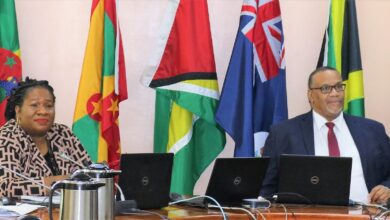It is my distinct honour, on behalf of the Government and people of Antigua and Barbuda, to be here at this important juncture in our history, to take up the mantle of Chairmanship of this esteemed Council. I am particularly pleased, as I had the privilege, several years ago, to participate in the constructive dialogue and management of trade and economic development issues across the Region within the aegis of this Council’s predecessor.
Colleagues, today, as Antigua and Barbuda takes the baton, we wish to pay tribute to the tremendous work done by the outgoing Chairman, Minister Ken Valley of Trinidad and Tobago, who through his vast experience and wisdom guided the Council to where we are today. Equally, His Excellency Dr. Edwin Carrington, and the many technical support staff of the Secretariat must also be complemented for their stewardship, despite the numerous challenges.
History, I am sure will record the invaluable contribution of the Secretariat in charting the Community’s ship, through often turbulent waters in an archipelago described by some as the “Caribbean necklace of islands,” with a firm collective resolve appropriately captured in the first citation of the Revised Treaty as “deepening regional economic integration through the establishment of the CARICOM Single Market and Economy (CSME) in order to achieve sustained economic development based on international competitiveness, coordinated economic and foreign policies, functional cooperation and enhanced trade and economic relations with third States”.
We also wish to recognise the contributions of the architects of the Regional Integration Movement who postulated the blueprint for a stronger and more vibrant Caribbean civilisation among the nation States of the world. Today, we are indebted to the many heroes who were involved in the integration process from the Caribbean Free Trade Area (CARIFTA) to CSME. Their contribution must be indelibly etched into the annals of history and should forever be highlighted in our schools and universities across the Caribbean. Those heroes of the CSME, recognised long ago that for the Caribbean Community to survive, it would require that we collectively weave a strong Caribbean identity, glued together by a policy framework, coupled with legal and procedural enforcement arrangements.
Colleagues, the deliberations that we will have today, and those held by our officials on Monday and Tuesday, will, I am sure, greatly contribute to our work in preparing the policy framework for full operationalisation of the CSME. As incoming Chairman of the Council, I seek your cooperation, to resolutely undertake the work to complete all outstanding commitments necessary for the Region as a whole to become CSME compliant. We are all aware of the challenges of climbing the mountain, but although the road may appear rough at times, be assured that the summit is within sight. To those countries that have already reached the summit, I congratulate you for honouring your commitment, and providing light to the darkness of the skeptics, encouragement to the weak, and support to the vulnerable. Antigua and Barbuda, will be working steadfastly in our programme to become CSME compliant as soon as possible. There are still, however, numerous challenges which we hope will be resolved through further assistance from the CARICOM Secretariat in the provision of a legal draftsman to undertake the programme.
The entire process to meet the 31st December 2005 deadline was challenging, particularly given our resource constraints. Yet, notwithstanding these constraints, we boldly joined the spirit and march towards the CSME, recognising that as one trading bloc, the Caribbean’s voice would be stronger. However, it has been a huge task to amend the numerous pieces of legislation that include the removal of restrictive practices, while establishing new institutions to respond to the expected harmonised development strategy envisaged in the CSME.
As you are aware, the Baldwin Spencer administration inherited an economy in fiscal decline, and the operationalisation of the CSME will pose further challenges that may only be addressed by the Community immediately introducing the promised “Affirmative Action Programme” in respect of the Less Developed Countries of CARICOM. We await Prime Minister Arthur’s Report on his mission through the OECS when elements of the “Affirmative Action” programme were fully adumbrated. However, while we await that Report, we welcome the proposal to establish a Regional Development Agency to address certain needs of the LDCs together with the management of the Development Fund.
Colleagues, as the Report of our officials reflects, the business community must become better organised and more conversant with the new realities of the Regional Integration Movement, and should also become more adaptable and responsive to circumstances as they occur. The cement trade is just one example that comes to mind. Now more than ever, no country can recoil into a cocoon or adopt behaviour akin to “Alice in wonderland” believing that the regional and global challenges will not affect it. It is businesses that trade, not governments. Therefore, the private sector must aggressively retool and adopt modern approaches and new business practices in its every day operations. This will, of course, require resources, and we must seek collectively and through our international partners to better support these efforts.
Ladies and Gentlemen: The Caribbean region is composed of many small States and territories, with small economies, and characteristics that make our said economies intrinsically vulnerable to external, natural and man-made shocks. In this regard, I must congratulate the Member States who supported the application for Article 164 treatment by the LDCs. The industries covered by Article 164 of the Revised Treaty, formerly Article 56, are quintessential to the very survival of our respective economies. It is useful to recall that the underlining principles of Chapter 7 of the Treaty recognise that these States will be entering the CSME at a disadvantage, because of small size, economic structure and vulnerability, and therefore, would require Special and Differential Treatment in order to address the imbalance. While Antigua and Barbuda might not be a significant beneficiary of the provision, we fully support and underscore the need for special and differential treatment for the LDC’s. We however provide the caveat and caution that protected industries and sectors should, as far as practicable, endeavour to respond to market forces and make greater efforts to achieve international competitiveness.
I conclude by stating that the CSME is an irreversible process and Member States must make every effort to ensure that our integration initiatives not only succeed, but are beneficial to all parties.
I thank you.





